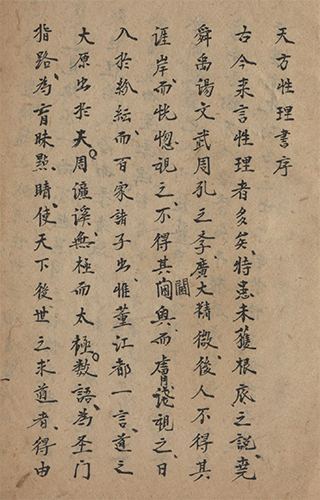The Xu Dishan Collection » Islam and Islamic texts
Islam and Islamic texts
The 1920s saw a new field of study emerge. The study of religion (zongjiao xue 宗教學). Studies of Religion were mainly supported by two milieus within Chinese society, the converts to Christianity (mainly of Protestant denomination) and the new intellectual class (Meyer, p42). Xu Dishan converted to Protestant Christianity in 1916. His widespread experience living and teaching outside China contributed to his interest in other cultures, languages and religions. He was one of the earliest and most educated teachers and researchers in religious studies. Xu Dishan had taught at least four courses related to religions and comparative religions at Yenching University. Although he did not write about Islam specifically, as a scholar of religious studies he did collect important texts on Islam.
Author: Friederike Schimmelpfennig (September 2021)
Islamic highlights from the Xu Dishan collection
Tian fang xing li 天方性理

One of the most important scripts is the Tianfang xingli 天方性理 (Nature and Principle in Islam) by Liu Zhi 劉智 (劉介廉 Liu Jielian; ca. 1660 – ca. 1739). This text was considered the authoritative exposition of Islamic beliefs and has been republished twenty-five times between 1760 and 1939. Liu Zhi is the most famous representative of the collection of Han kitab (漢克塔布; Arabic: کتاب), Chinese Islamic texts. The Tianfang xingli is one of a three book set (Tianfang dianli 天方典禮, Tianfang xingli, Tianfang zhisheng shilu 天方至聖實錄, all in the collection) that explore a single comprehensive vision of Islam, with the ability to harmonise Islamic and Neo-Confucian principles.
The text itself may not be rare in a classical understanding, since it was reprinted in different versions many times. However, the version held in ANU Library is a unique as it is a completely hand-written copy. The calligraphy shows remarkable craftsmanship. The author of this copy is unknown, Xu Dishan is known for having copied texts himself, but we are unable to determine whether he made this one.
- Works consulted:
- Meyer, C. (2015). “The emergence of “Religious Studies” in Numen, 62. p.20-75
- Frankel, J. (2016). “Liu Zhi: The Great Integrator of Chinese Islamic Thought”, in: Lipman (??) Islamic Thought in China. Edinburgh University Press, p.34-54
- Murata, S. “The Unity of Being in Liu Chih’s “Islamic Neoconfucianism”. Accessed 8/9/21









